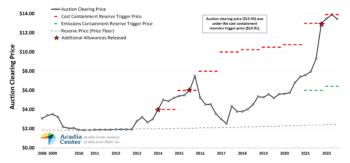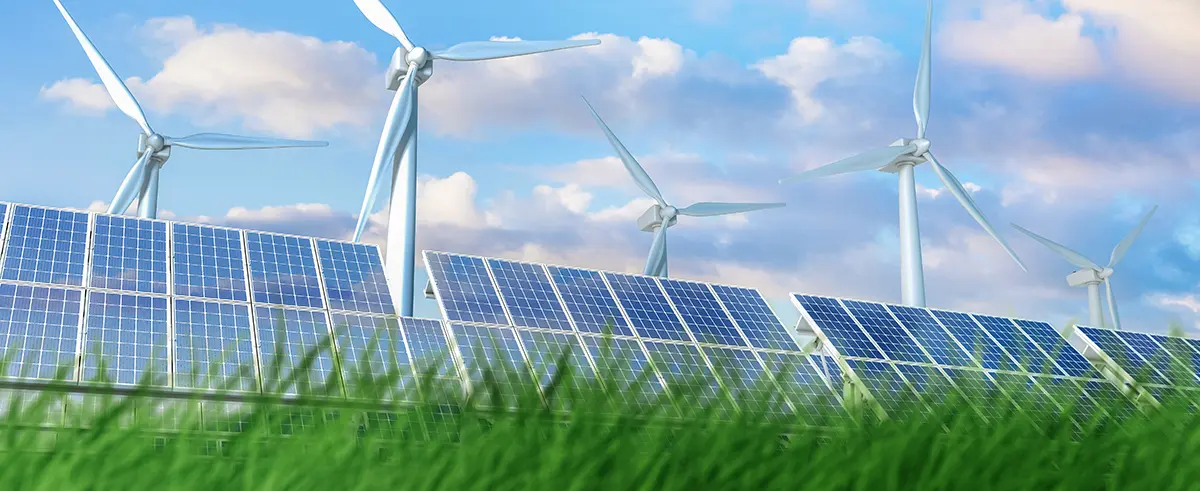Regional Greenhouse Gas Initiative (RGGI) Releases 57th Auction Results
Media Contacts:
Ben Butterworth, Director: Climate, Energy, and Equity Analysis
bbutterworth@acadiacenter.org, 617-742-0054 x111
Paola Moncada Tamayo, Policy Analyst
ptamayo@acadiacenter.org, 860-246-7121 x204
BOSTON, MA- On Friday, September 9, 2022, the eleven states participating in the Regional Greenhouse Gas Initiative (RGGI) released the results of the 57th auction. Emissions allowances were sold for $13.45 each, generating $301 million for clean energy investments in participating states. The allowance price for the RGGI program has declined for the first time since June of 2019. The Cost Containment Reserve (“CCR”) Trigger Price of $13.91 per ton was avoided, so no CCR allowances were sold in the auction. The proceeds from sales of allowances in the 57th auction was the third highest of all time, lower than only the proceeds from the 54th and 56th auction held in December of 2021 and June 2022.

Higher RGGI allowance price is good for climate, clean energy investment
The auction clearing price of $13.45 represents a modest 3% decrease from the previous auction in June, but a significant 45% increase from the auction price from one year ago. The clearing price represents the price that power plant operators must pay for each ton of CO2 emitted by their fossil-fuel-fired plants. The higher allowance prices seen in 2022 mean the RGGI program is sending a stronger incentive to produce electricity from carbon-free sources, like wind and solar. Recent auctions have demonstrated the growing significance of the CCR – the two most recent auctions narrowly avoided the CCR trigger price, while the 54th auction in December 2021 represented the first time since 2015 that additional allowances were released because of triggering the CCR.
Since the program launched, the vast majority of RGGI proceeds have been invested in energy efficiency and clean energy projects as detailed in the report on RGGI investments in 2020, released in May of this year. The $301 million in proceeds generated in this auction brings the annual to-date total to $904.8 million, already 98% of the previous year’s record-setting total proceeds with one more remaining auction in 2022. Auction proceeds have increased dramatically in recent years. For example, the auction proceeds of 2022 so far are 73% higher than the total proceeds generated in all 2018 and 2019 auctions combined. This is great news for climate action, the economy, and the growing workforce in energy efficiency and clean energy.
RGGI Third Program Review Offers an Opportunity to Direct Proceeds Towards Clean Energy Investments that Directly Benefit Environmental Justice Communities
Since its establishment, RGGI’s priorities have centered around reducing pollution from fossil fuel power plants and achieving climate solutions for RGGI states. Through the sale of CO2 allowances, the market-based program has continued to produce revenue for participating states to invest in clean and renewable energy programs, energy efficiency programs to save energy, bill assistance, and much more. While states continue to report the benefit that RGGI contributes to meeting their climate goals, it is important to ensure that these proceeds are both spent on climate and clean energy and invested in communities that suffer disproportionately from the negative consequences associated with pollution from fossil fuel power generation.
The Third RGGI Program Review offers a golden opportunity to tailor the program to ensure that environmental justice communities are not left to bear a disproportionate burden and are actively involved in the development of strategies to ensure a smooth, equitable transition to a carbon-free economy. During the program review, it is essential that each RGGI state critically consider equitable investment into communities that face the worst effects of polluting power plants. This ongoing program review provides a chance for states to consider the recent auctions, history of investments across the states, the need to directly address environmental justice communities, and other mechanisms associated with the cap-and-invest program.
Acadia Center remains closely involved in RGGI policy conversations across the RGGI states and will continue to advocate for program reforms that drive equitable investment and climate action.



















